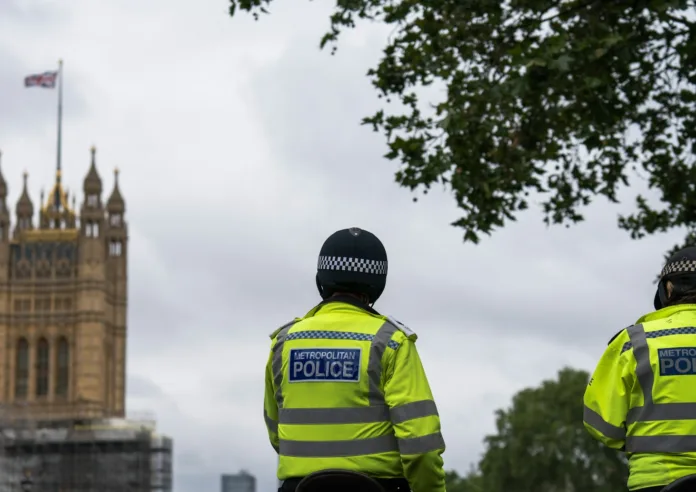PC Perry Lathwood’s actions resulted in bruising injuries to Jocelyn Agyemang in front of her young son
A Metropolitan Police officer, PC Perry Lathwood, has been found guilty of assaulting a woman, Jocelyn Agyemang, during a wrongful arrest for bus fare evasion. The incident occurred on July 21 last year in Croydon, South London, and was captured on bodycam footage that circulated widely online. Lathwood, aged 50, from Norman’s Bay, East Sussex, was convicted at Westminster Magistrates’ Court on Friday after a trial.
The footage shows Lathwood forcefully grabbing and handcuffing Agyemang, causing bruising injuries to her arm. Despite her repeated pleas that she had done nothing wrong, Lathwood persisted in detaining her. Deputy Senior District Judge Tan Ikram condemned Lathwood’s actions, stating it was “not necessary to grab the woman’s arm, arrest her and handcuff her.” The judge emphasized that there were no reasonable grounds to justify the arrest and described Lathwood’s actions as an overreaction and error in judgment.
Embed from Getty ImagesInitially investigated by the Independent Office for Police Conduct (IOPC) for racially aggravated assault, Lathwood was ultimately charged with assault by beating. The trial revealed that police officers, including Lathwood, were assisting ticket inspectors on a bus in Croydon when the incident unfolded. Prosecutor Paul Jarvis explained that Agyemang had just disembarked the bus with her son and was approached by a ticket inspector who asked her to show her fare. When Agyemang walked away without handing over her ticket, Lathwood intervened.
Lathwood grabbed Agyemang’s arm and arrested her for fare evasion, despite her protests and the absence of evidence that she had evaded the fare. A crowd quickly gathered, filming the incident and questioning the officer’s actions. The footage shows Agyemang shouting and asking the officers to let go while a bystander recorded the event and inquired about the reason for her arrest.
Jarvis recounted how Lathwood continued to hold Agyemang and handcuffed her, insisting she tap her card. Another officer eventually took Agyemang’s Oyster card to verify payment. It was soon confirmed that she had indeed paid her fare, leading to her immediate de-arrest. In her testimony, Agyemang described feeling “very violated” and “degraded” by the experience, which she found particularly distressing given her past traumas and the presence of her young son.
PC Lathwood defended his actions in court, claiming he had “no idea” what else he could have done to prevent Agyemang from leaving the scene. He argued that her refusal to show her card justified his decision to arrest her. However, the court found his actions excessive and unjustified.
The incident ignited an anti-racism protest outside the local police station, where community members expressed their outrage over the treatment of Agyemang. Benjamin Clement, a witness who filmed the arrest, described feeling compelled to document the event, noting the distress and lack of care shown by the officers involved.
The IOPC conducted an independent investigation into the incident, concluding that the use of force by Lathwood was unreasonable, disproportionate, and unjustifiable. Regional director Mel Palmer emphasized the seriousness of the decision to refer the case to the Crown Prosecution Service (CPS) and the subsequent criminal charges. The IOPC will now liaise with the Metropolitan Police to initiate disciplinary proceedings against Lathwood.
PC Perry Lathwood is scheduled for sentencing at Westminster Magistrates’ Court on June 14.
Analysis:
The wrongful arrest and subsequent assault of Jocelyn Agyemang by PC Perry Lathwood highlight critical issues within the Metropolitan Police force and broader societal implications. Politically, this incident underscores ongoing concerns about police accountability and the use of force, particularly in interactions with minority communities. The conviction of Lathwood sends a clear message about the consequences of excessive force and misconduct.
Sociologically, the incident sheds light on the dynamics of power and control in law enforcement. Agyemang’s experience reflects broader societal issues of authority misuse and the vulnerability of individuals in confrontations with police. Her distress and the public’s reaction illustrate the community’s growing intolerance for such abuses of power.
Economically, the wrongful arrest for fare evasion touches on the socioeconomic struggles faced by many individuals. Agyemang, who was simply transporting her son and preparing for an appointment, found herself entangled in a situation that escalated unnecessarily. This scenario underscores the disproportionate impact of law enforcement practices on economically disadvantaged individuals.
From a gender perspective, Agyemang’s experience highlights the specific vulnerabilities women face in encounters with law enforcement. Her description of feeling violated and degraded underscores the emotional and psychological toll such incidents can have. The presence of her young son during the arrest further amplifies the trauma, reflecting the broader implications for family dynamics and child welfare.
Race and minority issues are central to this case, as the incident fueled anti-racism protests and highlighted the perceived racial bias in policing practices. The initial investigation for racially aggravated assault, though not pursued, signals the underlying racial tensions that influence public perception and community trust in law enforcement.
Theoretical perspectives on systemic racism and institutional bias are crucial in understanding the ramifications of this incident. The community’s response, marked by protests and public outcry, reflects a collective demand for justice and systemic reform. The IOPC’s involvement and the subsequent criminal charges against Lathwood represent steps towards accountability but also underscore the need for ongoing scrutiny and reform within the police force.
In conclusion, the case of PC Perry Lathwood and Jocelyn Agyemang serves as a poignant reminder of the complexities and challenges within modern policing. It calls for a multifaceted approach to address issues of accountability, power dynamics, socioeconomic disparities, gender vulnerabilities, and racial bias. The incident and its aftermath highlight the urgent need for comprehensive reforms to ensure justice, fairness, and community trust in law enforcement.
